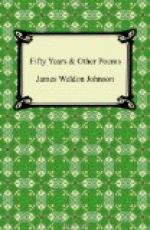When we take stock of ourselves these ten millions cannot be left out of account. Yet they are not as we are; they stand apart, more or less; they have their own distinct characteristics. It behooves us to understand them as best we can and to discover what manner of people they are. And we are justified in inquiring how far they have revealed themselves, their racial characteristics, their abiding traits, their longing aspirations,—how far have they disclosed these in one or another of the several arts. They have had their poets, their painters, their composers, and yet most of these have ignored their racial opportunity and have worked in imitation and in emulation of their white predecessors and contemporaries, content to handle again the traditional themes. The most important and the most significant contributions they have made to art are in music,—first in the plaintive beauty of the so-called “Negro spirituals”—and, secondly, in the syncopated melody of so-called “ragtime” which has now taken the whole world captive.
In poetry, especially in the lyric, wherein the soul is free to find full expression for its innermost emotions, their attempts have been, for the most part, divisible into two classes. In the first of these may be grouped the verses in which the lyrist put forth sentiments common to all mankind and in no wise specifically those of his own race; and from the days of Phyllis Wheatley to the present the most of the poems written by men who were not wholly white are indistinguishable from the poems written by men who were wholly white. Whatever their merits might be, these verses cast little or no light upon the deeper racial sentiments of the people to whom the poets themselves belonged. But in the lyrics to be grouped in the second of these classes there was a racial quality. This contained the dialect verses in which there was an avowed purpose of recapturing the color, the flavor, the movement of life in “the quarters,” in the cotton field and in the canebrake. Even in this effort, white authors had led the way; Irvin Russell and Joel Chandler Harris had made the path straight for Paul Laurence Dunbar, with his lilting lyrics, often infused with the pathos of a down-trodden folk.
In the following pages Mr. James Weldon Johnson conforms to both of these traditions. He gathers together a group of lyrics, delicate in workmanship, fragrant with sentiment, and phrased in pure and unexceptionable English. Then he has another group of dialect verses, racy of the soil, pungent in flavor, swinging in rhythm and adroit in rhyme. But where he shows himself a pioneer is the half-dozen larger and bolder poems, of a loftier strain, in which he has been nobly successful in expressing the higher aspirations of his own people. It is in uttering this cry for recognition, for sympathy, for understanding, and above all, for justice, that Mr. Johnson is most original and most powerful. In the superb and soaring stanzas




